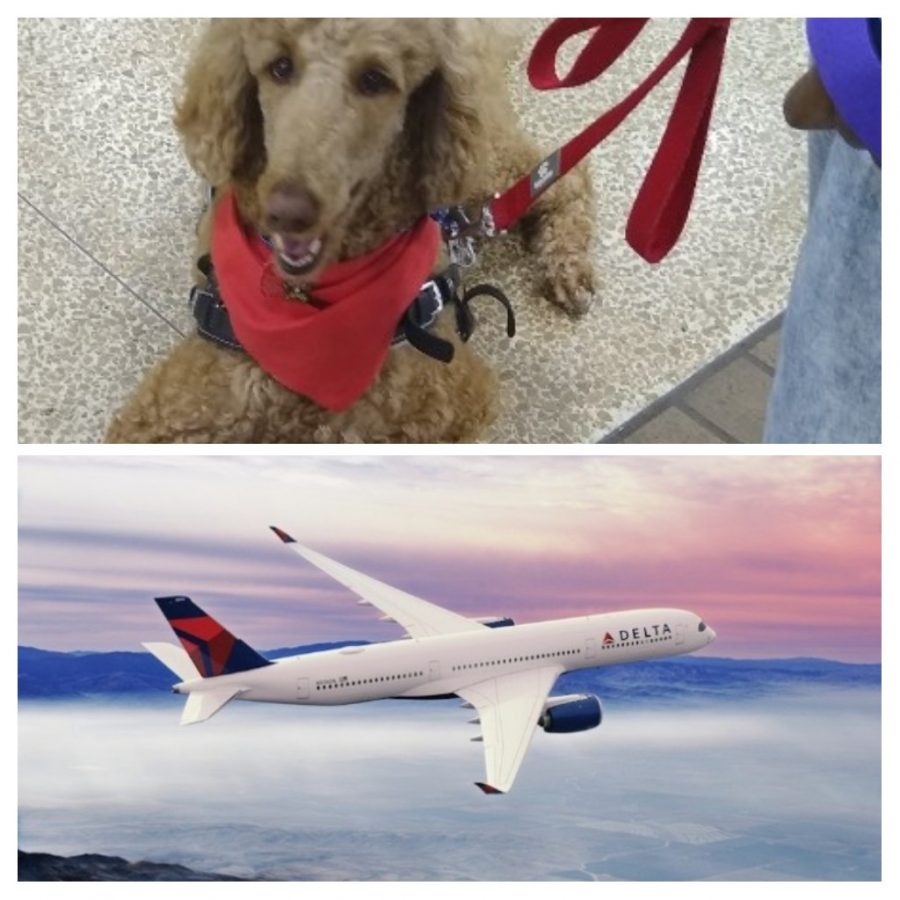Say goodbye to furry friends: Delta bans emotional support animals
Photo source (plane): Delta News Hub , Service dog: Chancelor Gordon
Service dog and Delta Flight. Delta banned Emotional Support Animals from flights starting January 11, following the lead of fellow airlines. Delta’s decision caused varying reactions on all sides of the issue.
January 22, 2021
Delta Airlines banned emotional support animals (ESAs) as of Monday, January 11th, following Alaska, United, and American Airlines. The United States Department of Transportation released a final rule overturning the Air Carrier Access Act that previously protected ESAs by law, spurring these changes. No longer identified as service animals, Delta Airlines will treat ESAs as pets.
Emotional support animals provide comfort and support to people with mental health conditions and emotional trauma in the form of companionship. Any animal can qualify as an ESA if they help relieve symptoms of these conditions. Previously, passengers with an ESA travelled with them in the main cabin for no additional fees, identical to the rights afforded to service animals. However, these new changes remove such privileges; now considered pets, passengers will pay a required fee, and the animals will travel in the cargo area underneath the main cabin with other pets. Delta believes the lack of fees provided an incentive for passengers to claim their pet as an ESA, which caused an increase in illegitimate emotional support animals.
“The DOT’s final rule enables airlines to put the safety of all employees and customers first, while protecting the rights of customers who need to travel with trained service animals,” Allison Ausband, senior vice president of In-Flight Service, said.
Since 2016, Delta Airlines experienced an 85% increase in animal incidents. Passengers attempted to misrepresent their animals as service animals on numerous occasions with exotic animals becoming increasingly common. Poorly behaved animals caused disturbances on flights by lashing out and harming other animals and passengers; urination and defecation issues resulted in unpleasant and uncomfortable flights for all. Inappropriate behavior pushed employees, passengers, and Delta further against animals on flights.
Despite the belief that airline efforts will make flights safer, several people disagree with the recent changes.
“These proposals will make it much harder for people with disabilities to travel. It’s unconscionable that the DOT is putting convenience for the airline industry ahead of the rights of people with disabilities to travel freely like all other citizens,” Curt Decker, the executive director of the National Disability Rights Network (NDRN), said.
The NDRN strives to ensure the travel rights of people with disabilities. Decker expresses the NDRN’s discontent with the ruling, addressing airlines’ narrow minded approach to the situation. He highlights that people in legitimate need of an emotional support animal, especially during a high stress situation such as flying, that find themselves unable to pay the high fees for travelling with their animal must now go without flying.
Emotional support animal owners disgruntled by the situation created a petition on Change.org that received almost two thousand signatures. Around 51 million people, 1 in 5 adults, in the United States deal with a mental illness. Those opposed to the new changes believe that the airlines acted with disregard to people who rely on ESAs.
The final rule also tightens restrictions on service animals, requiring owners to submit numerous additional forms than previously required. Service animals, now restricted to dogs only, can no longer include miniature horses. Differing from emotional support animals, service animals undergo training to specifically meet the needs of someone with a disability, such as a Seeing Eye dog.
“We acknowledge that some people have misrepresented themselves and their pets as people with disabilities with service or emotional support animals. But it is rare. These proposals are a vast overreaction to an uncommon problem,” Decker said.
Decker deems the tightening of restrictions on ESAs and service animals as unnecessary and discriminatory. Transportation systems frequently fail to accommodate people with disabilities, and Decker fears these actions will “exacerbate existing inequities for people with disabilities participating in air travel.”
“I think it is wrong for them to ban ESAs because some people truly do need them, especially on a plane. However, I do know that other passengers could be uncomfortable with certain animals. I believe there needs to be a compromise,” junior Chloe Malcom said.
Southwest Airlines, the world’s largest airline, applauds Delta and the other airlines for the changes but does not intend on changing their policies regarding ESAs as of now.
“Our top priority is the health, safety and comfort of Delta customers and our people. We strongly believe this policy change will enhance the overall travel experience for everyone,” Delta said.








Florece Mitchell-Herron • Jan 24, 2021 at 12:20 PM
Very informative and thoughtfully written article. This is an issue that needs more attention, thank you for shedding light on this topic.
Florece Herron
Von McNeal • Jan 22, 2021 at 10:16 PM
This article was extremely well written. I learned the difference between an ESA and a Service Animal and was made aware of issues that I had no idea existed on flights.